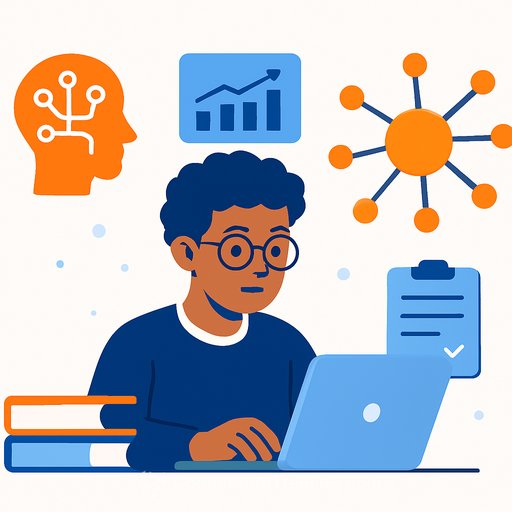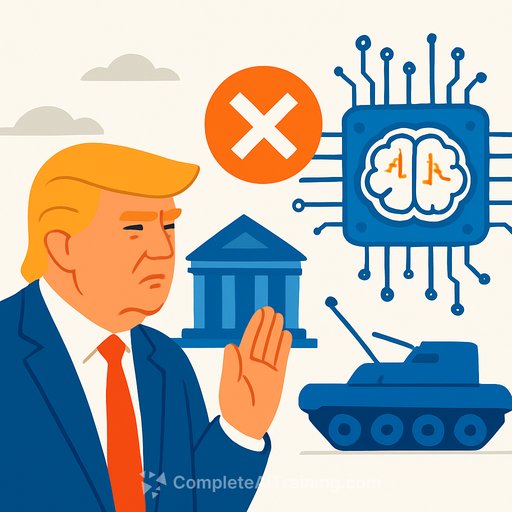Government plans new qualifications for data science and AI
The Government is exploring new 16-18 qualifications in data science and AI as part of a wider refresh of the national curriculum. The goal: raise standards, widen opportunity, and build a skills pipeline that fuels the UK economy.
This work responds to recommendations from Professor Becky Francis's Curriculum and Assessment Review and supports the Prime Minister's target for two-thirds of young people to be in higher-level learning by age 25 under the Plan for Change.
Why this matters for government teams
Departments, agencies, and local partners will feel the effects across funding, accountability, teacher development, and assessment systems. The proposals also target the "lost years" at the start of secondary to reduce inequality, especially for working-class pupils who fall behind early.
What changes are on the table
- New qualifications in data science and AI for 16-18-year-olds, expanding routes into high-demand technical and analytical roles.
- A stronger core: reading, science, and maths as non-negotiables for every pupil.
- Primary pupils to learn how to spot fake news and identify misinformation and disinformation.
- More on money basics in primary, reflecting that many children are consumers before secondary school.
- A new statutory reading test in Year 8 and a stronger writing assessment in Year 6 to identify pupils needing support or extra stretch.
- Arts GCSEs given equal status to humanities and languages.
- A core enrichment entitlement across civic engagement, arts and culture, nature and adventure, sport, and life skills.
- Expectation that schools work to offer triple science GCSE as standard.
Ministerial perspective
The Education Secretary set the tone clearly: schools must secure firm knowledge and practical skills so young people can meet today's challenges and seize tomorrow's opportunities, from reading fundamentals to spotting fake news.
Implementation considerations
- Define scope and level for the proposed AI and data science qualifications, with clear progression into FE, HE, and apprenticeships.
- Co-design with employers, awarding bodies, and sector experts to keep content current and useful.
- Plan workforce development (subject knowledge, pedagogy, ethics, and safety) for teachers and support staff.
- Update assessment systems and data pipelines for the new Year 8 reading test and strengthened Year 6 writing assessment.
- Ensure resources for media literacy and financial education in primary are high-quality, age-appropriate, and evidence-based.
- Address safeguarding, bias, and data protection when using AI tools in classrooms.
- Budget for training, materials, and technology access so delivery is consistent across regions.
Immediate actions for policy, LAs, trusts, and delivery partners
- Map current STEM and digital pathways (GCSEs, A levels, T Levels, apprenticeships) and identify where new AI/data science options fit.
- Convene working groups with employers, universities, and awarding bodies to shape qualification content and assessment models.
- Prepare for literacy changes: audit reading and writing interventions, build capacity for targeted support and stretch, and set up progress tracking.
- Pilot media literacy and money lessons in a small number of primary schools; capture what works and scale.
- Plan teacher CPD in data literacy, statistics, AI concepts, and ethical use; prioritise departments most affected.
- Run equality impact assessments to prevent widening gaps, with a focus on pupils who typically fall behind in early secondary.
- Align safeguarding and online safety policies with new classroom practices (misinformation, content risk, and AI usage).
- Draft a clear communications plan for parents and carers that explains what's changing and why.
- Design monitoring and evaluation from the start, including baselines for literacy and participation in advanced science.
What success looks like
- More pupils meeting secure benchmarks in reading, writing, and maths by the end of Year 8.
- Higher take-up of triple science and stronger science attainment.
- Proven gains in media literacy and financial awareness in primary.
- Credible 16-18 AI and data science pathways that lead into quality jobs, degrees, or higher apprenticeships.
- Reduced attainment gaps through earlier, smarter interventions.
Policy link to higher-level learning
The package supports the two-thirds participation target by building academic confidence early, strengthening science options at 14-16, and opening technical routes in AI and data at 16-18. Delivery will depend on strong teacher supply, clear standards, and stable funding.
Useful resources
Further development for teams
If your department or trust is planning staff upskilling in AI and data literacy, see curated options by role here: Complete AI Training - Courses by Job.
Your membership also unlocks:





